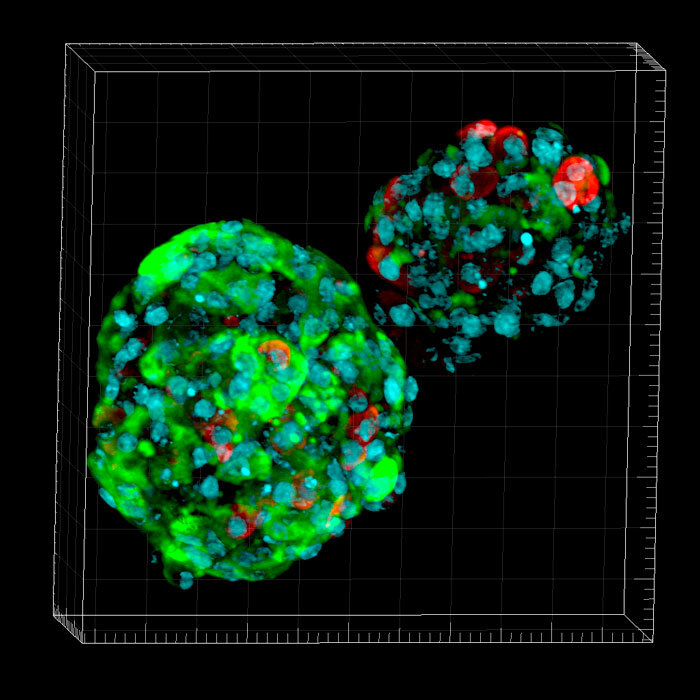Human islets stained and imaged in 3D using confocal microscopy. β-cells = insulin in green; α-cells = glucagon in red; nuclei are shown in cyan.
The main research interests of the Cnop group are the role of pancreatic β cell dysfunction and apoptosis in the pathogenesis of type 2 diabetes and monogenic forms of diabetes, in order to develop novel strategies to improve functional β-cell mass. Miriam Cnop has an active endocrine outpatient clinic at the Endocrine Division of the ULB Erasmus Hospital, with a particular focus on clinical care of diabetic patients. Her clinical work and observations provide a basis for her translational research.
Miriam Cnop obtained her MD degree at the Vrije Universiteit Brussel in 1995, was trained in Internal Medicine and Endocrinology in Brussels and obtained a PhD degree at the Vrije Universiteit Brussel in 2002 for her work on the effects of lipoproteins and free fatty acids on pancreatic β cells. She worked as a postdoctoral fellow with Steven Kahn at the University of Washington, Seattle, studying the relative contribution of insulin resistance and β cell dysfunction in the pathogenesis of type 2 diabetes. She currently directs the ULB Center for Diabetes Research, and holds appointments as Professor and Clinical Director of the Erasmus Hospital and Chargé de Cours/Associate Professor of the Faculty of Medicine, Université Libre de Bruxelles. She is the Director of the UCDR since October 2019.

Laurence Ladriere obtained her Zoology Master Degree at the Université de Mons in 1994, and her PhD Degree in Biology Sciences in Experimental Medicine Laboratory at the Université Libre de Bruxelles in 2002. During her PhD, she studied metabolic and insulinotropic actions of nutrient esters. In 2002, she shifted her research to the molecular mechanisms of pancreatic β-cell dysfunction in type 2 diabetes, working together with Dr Cnop. In 2008, she obtained a permanent position as Chargée de Cours/Associate Professor of the Faculty of Medicine, Université Libre de Bruxelles. She is co-director of the Biology Teaching laboratory.

In the Endocrine Division of the Erasmus Hospital Miriam Cnop has an active endocrine outpatient clinic, with a particular focus on clinical care of diabetic patients. Her interests lie in the early and accurate diagnosis of type 1 diabetes, type 2 diabetes and monogenic forms of diabetes, in order to tailor treatment choices. Using phenotyping and genotyping approaches, personalized treatment is proposed as a function of diabetes etiology. She also co-directs the obesity clinic that provides comprehensive patient phenotyping and lifestyle, endoscopic and surgical treatment choices.
The main research interests of the Cnop group are the role of pancreatic β-cell dysfunction and apoptosis in the pathogenesis of type 2 diabetes and monogenic forms of diabetes, in order to develop novel strategies to improve functional β cell mass. The Cnop group has identified endoplasmic reticulum stress as an important cellular response contributing to free fatty acid-induced β cell apoptosis. The monogenic forms of diabetes under study in her group include diseases due to mutations in genes with a role in endoplasmic reticulum stress, mitochondrial function and tRNA biology. The Cnop group demonstrated that β-cell dysfunction and death are central in the pathogenesis of diabetes in Friedreich ataxia, a mitochondrial neurodegenerative disease. She identified new forms of diabetes caused by mutations in TRMT10A, a tRNA methyl transferase, PPP1R15B, a regulator of endoplasmic reticulum stress signaling, and RFX6, a transcription factor regulating incretin secretion and β-cell function. To gain further insight into the pathways of β-cell failure in diabetes and to test novel therapies, she implemented the differentiation of patient-derived induced pluripotent stem cells into β-cells, which provides a highly relevant disease-in-a-dish model.

Human islets stained and imaged in 3D using confocal microscopy. β-cells = insulin in green; α-cells = glucagon in red; nuclei are shown in cyan.
2003 Endocrinology Research Prize by the Royal Academy of Science of Belgium
2004 Novo Nordisk Prize for Diabetology, Belgium
2005 Rising Star of the European Association for the Study of Diabetes
2010 Belgian Endocrine Society Annual Award
2010 GB Morgagni Young Investigator Award, awarded under the auspices of the School of Medicine of the University of Padua, Italy
2013 Oskar Minkowski Award of the European Association for the Study of Diabetes, the most important award for a European diabetes researcher under the age of 45 years
2014 Auguste Loubatieres Prize of the French Diabetes Society
2017 Associate Member of the Royal Academy of Medicine of Belgium
Cnop M, Havel PJ, Utzschneider KM, Carr DB, Sinha MK, Boyko EJ, Retzlaff BM, Knopp RH, Brunzell JD and Kahn SE. Relationship of adiponectin to body fat distribution, insulin sensitivity and plasma lipoproteins: evidence for independent roles of age and sex. Diabetologia 2003, 46:459-469.
Cnop M, Vidal J, Hull RL, Utzschneider KM, Carr DB, Schraw T, Scherer PE, Boyko EJ, Fujimoto WY and Kahn SE. Progressive loss of β-cell function leads to worsening glucose tolerance in first-degree relatives of subjects with type 2 diabetes. Diabetes Care 2007, 30:677-682.
Cnop M, Hughes SJ, Igoillo-Esteve M, Hoppa MB, Sayyed F, van de Laar L, Gunter JH, de Koning EJP, Walls GV, Gray DWG, Johnson PRV, Hansen BC, Morris JF, Pipeleers-Marichal M, Cnop I and Clark A. The long lifespan and low turnover of human islet beta cells estimated by mathematical modelling of lipofuscin accumulation. Diabetologia 2010, 53:321-330.
Cnop M, Igoillo-Esteve M, Rai M, Begu A, Serroukh Y, Depondt C, Musuaya AE, Marhfour I, Ladrière L, Moles Lopez X, Lefkaditis D, Moore F, Brion JP, Cooper JM, Schapira AHV, Clark A, Koeppen AH, Marchetti P, Pandolfo M, Eizirik DL and Féry F. Central role and mechanisms of β cell dysfunction and death in Friedreich ataxia-associated diabetes. Ann Neurol 2012, 72:971-982.
Cnop M, Abdulkarim B, Bottu G, Cunha DA, Igoillo-Esteve M, Masini M, Turatsinze JV, Griebel T, Villate O, Santin I, Bugliani M, Ladriere L, Marselli L, McCarthy MI, Marchetti P, Sammeth M and Eizirik DL. RNA sequencing identifies dysregulation of the human pancreatic islet transcriptome by the saturated fatty acid palmitate. Diabetes 2014, 63:1978-1993.
Patel KA, Kettunen J, Laakso M, Stančáková A, Laver TW, Colclough K, Johnson MB, Abramowicz M, Groop L, Miettinen PJ, Sheppard MH, Flanagan SE, Ellard S, Inagaki N, Hattersley AT, Tuomi T, Cnop M* and Weedon MN*. Heterozygous RFX6 protein truncating variants are associated with Maturity-Onset Diabetes of the Young (MODY) with reduced penetrance. Nat Commun 2017, 8:888.
Cnop M, Toivonen S, Igoillo Esteve M, Salpea P: Endoplasmic reticulum stress and eIF2α phosphorylation: the Achilles heel of pancreatic β cells. Mol Metab 2017;6:1024-1039
Cosentino C, Toivonen S, Diaz Villamil E, Atta M, Ravanat JL, Demine S, Schiavo AA, Pachera N, Deglasse JP, Jonas JC, Balboa D, Otonkoski T, Pearson ER, Marchetti P, Eizirik DL, Cnop M, Igoillo-Esteve M: Pancreatic β-cell tRNA hypomethylation and fragmentation link TRMT10A deficiency with diabetes. Nucleic Acids Res 2018;46:10302-10318
Igoillo-Esteve M, Oliveira AF, Cosentino C, Fantuzzi F, Demarez C, Toivonen S, Hu A, Chintawar S, Lopes M, Pachera N, Cai Y, Abdulkarim B, Rai M, Marselli L, Marchetti P, Tariq M, Jonas JC, Boscolo M, Pandolfo M, Eizirik DL, Cnop M: Exenatide induces frataxin expression and improves mitochondrial function in Friedreich ataxia. JCI Insight 2020;5
Eizirik DL, Pasquali L, Cnop M: Pancreatic β-cells in type 1 and type 2 diabetes mellitus: different pathways to failure. Nat Rev Endocrinol 2020;16:349-362

Brussels (Anderlecht), Belgium
U.L.B. campus Erasme, Route de Lennik 808
Building GE, 5th floor
ULB Center for Diabetes Research, wing E2